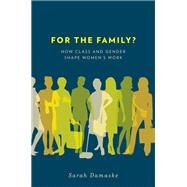For the Family? How Class and Gender Shape Women's Work
, by Damaske, Sarah- ISBN: 9780199791507 | 0199791503
- Cover: Hardcover
- Copyright: 10/3/2011
In the emotional public debate about women and work, conventional wisdom holds that middle-class women "choose" whether or not to work, while working class "need" to work. Yet, despite the recent economic crisis, national trends show that middle-class women are more likely to work than working-class women. In this timely volume, Sarah Damaske debunks the myth that financial needs determine women's workforce participation, revealing that financial resources make it easier for women to remain at work, not easier to leave it. Departing from mainstream research, Damaske finds not two (working or not working), butthreemain employment patterns: steady, pulled back, and interrupted. Looking at the differences between women in these three groups, Damaske discovers that financial resources made it easier for middle-class women to remain at work steadily, while working-class women often found themselves following interrupted work pathways in which they experienced multiple bouts of unemployment. While most of the national attention has been focused on women who leave work, Damaske shows that both middle-class and working-class women found themselves pulling back from work, but for vastly different reasons.For the Family?concludes that the public debate about women's work remains focused on need because women themselves emphasize the importance of family needs in their decision-making. Damaske argues that despite differences in work experiences, class, race, and familial support, most women explained their work decisions by pointing to family needs, connecting work to family rather than an individual pursuit. InFor the Family?, Sarah Damaske at last provides a far more nuanced and richer picture of women, work, and class than conventional wisdom offers.







